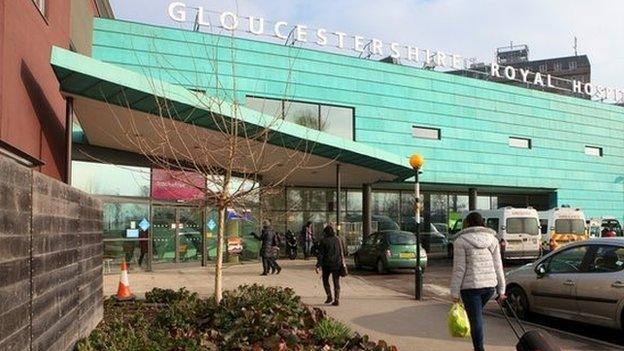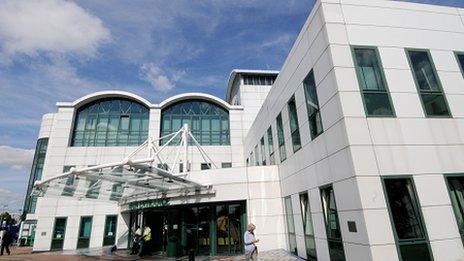'Major incidents' declared at English hospitals
- Published
Mike Proctor, Scarborough Hospital: "I'm seeing pressures in this system we have never seen before"
Major incidents have been declared at a number of hospitals in England as medical staff struggle to cope with patient numbers.
Gloucestershire Royal and Cheltenham General implemented the emergency measure for the second time in three weeks.
Hospitals in North Yorkshire, Surrey and Staffordshire have also declared a major incident.
People have been urged to only use A&E departments for genuine emergencies.
Ann Marie Morris, clinical director for emergency medicine at Royal Stoke University Hospital, said: "As part of our plans to manage high demands on NHS services, clinical teams have taken the decision to postpone some operations to ensure they can deal with acute and emergency care such as accidents, medical and surgical emergencies.
"Clinicians have not taken this decision lightly, and every effort will be made to reschedule their treatment as soon as we can."
'Every ward full'
Mike Proctor, deputy chief executive of York Teaching Hospital NHS Foundation Trust which runs Scarborough Hospital, said: "I'm seeing pressures in the system that I have never experienced before.
"When I came to the hospital this morning every ward was full, every escalation area we put beds into were full of patients.
"In addition to that there were 18 patients in the A&E department that had to be cared for on beds, because there were no beds in the hospital wards for them to go to.
"Whilst those patients were cared for properly, you get to a stage where if you carried along that line the emergency department would cease to function, which is why we had to do something different."

Analysis: Nick Triggle, BBC Health Correspondent
If a hospital declares a major incident, it is a sign that things have got exceptionally busy and special measures are needed to cope.
This can happen in winter when demands are high, but also at other times, for example if there is a major road accident. The declaration allows hospital bosses to call in extra staff to help them cope.
But what is also important is what steps they take in terms of restricting the flow of patients into the hospital. One of the first measures is to start postponing routine activity, such as knee and hip operations or outpatient appointments. This is not uncommon.
More unusual is diverting ambulances so no emergency patients arrive. In effect, that closes the hospital. However, this is only used as a last resort as it increases demands on nearby sites.

United Lincolnshire Hospitals Trust said it was putting plans in place as it struggled to cope with demand.
Acting chief nurse Pauline Pratt told BBC Radio Lincolnshire hospital operations were running as a "major incident situation", but the trust later denied that was the case.
About 70 patients are "medically fit" to leave hospitals in Lincolnshire but cannot be discharged as they cannot be cared for adequately afterwards, Ms Pratt said.
It comes after staff at the Lincoln County Hospital, Boston's Pilgrim Hospital and the Grantham and District Hospital were asked to cancel leave over Christmas because hospitals were busier than had been anticipated.
The majority of outpatient appointments have been cancelled at Ashford Hospital and St Peter's Hospitals in Surrey and non-emergency patients have been told they will face an "extremely long wait".
An NHS spokesman said 30% of people using Gloucestershire Royal and Cheltenham General's emergency departments had "non-urgent ailments".
Gloucestershire Hospitals NHS Foundation Trust said another factor contributing to the current problem was the high number of "elderly patients being admitted, whose needs are often more complex".
Affected hospitals have urged patients to visit their GP or attend a pharmacy, walk-in centre or minor injuries unit if appropriate.
The major incidents will be reviewed regularly.
Did you attend your local A&E department over the Christmas and new year period? What was your experience? You can contact us at haveyoursay@bbc.co.uk, external. Please leave a telephone number if you are willing to be contacted by a BBC journalist.
- Published5 January 2015

- Published5 January 2015
